Yesterday’s mid-day meal at Le Code Bar consisted of a noodle soup, ham salad, and plentiful roast chicken and chips followed by a Paris-Brest dessert, of which a welcome second helping was, with a smile, placed on my table by Fred as I worked on my blog post.
Later, I watched Prime Suspect Two. The first production had dealt with sexism. This one has racism as its sub-plot. It is as tense a well-acted and directed drama as its predecessor. I then began reading ‘Keeping the World Away’ by Margaret Forster.
This morning I undertook a bit more clearing up. A wasps’ nest had been found in the attic and eradicated by Renov Conseil 24. With a dustpan and brush I transferred the corpses to the garden. Like the survivor of a massacre protected by a screen of deceased comrades, the largest of all the vespas staggered from the heap and crawled towards the lip of the pan. I gave it its chance on the earth outside. I do hope it doesn’t create another home inside.
I do hope it doesn’t create another home inside.
On leaving the house to make my farewells at Le Code Bar, I met a two year old and his grandmother. I had some difficulty in communicating with the little boy who was dragging his cart over the steps to No 6. Grandma spoke clear northern French so there was no problem there. I explained that I had equal difficulty understanding such small children in England. She identified with this, saying it wasn’t easy for her either.
The ATM at Credit Agricole told me it couldn’t give me any money and I should contact my bank. I had only attempted to withdraw 20 euros to pay for my taxi. There was plenty in my account and I had entered the correct PIN. Taxi Eymetois would, I know, have been happy to wait until next time, but that wasn’t the point.
I telephoned Barclays in Paris. I have previously written that they transferred my account from Bergerac without telling me. This time I was told that my card had been blocked in September. The very helpful woman who spoke to me did not know the reason for this, but she freed the account and told me I could use the card again from tomorrow morning. When I explained that that would be too late, she was most apologetic, but could do know more. As I said to her, thank goodness Taxi Eymetois have become friends.
It is because I came away in September with enough euros to see me through until today that this was the first time I had attempted to withdraw cash on this trip. Had I done so earlier in the week, one day’s delay would have been manageable. Having relaxed after resolving this problem, I drew out 20 euros with my NatWest card. The transfer fee on such a small sum will be minimal, but I had opened the French account in order to avoid such supplements. Unfortunately my English bank does not operate in France.
Sandrine arrived early to collect me and drive me to Bergerac Airport. When I told her the tale of the card she said, as I knew she would, that I should have waited to pay them next time. The plane journey went smoothly and Jackie was waiting at Southampton to drive me home.
My iMac happily accepted my Sandisk photos and I was able to upload them to the last week’s posts.
This evening Jackie and I dined at Curry Garden in Ringwood, and enjoyed the usual good food and efficient, friendly, service. We both drank Kingfisher.
Author: admin
Terminal Illness
Last night I watched ‘Prime Suspect’, the first of that iconic long-running television series starring the brilliant Helen Mirren. This episode charts Jane Tennison, the female DCI’s gradually earning of the support of all but one of her initially resistant male team. Tom Bell’s superbly odious sergeant is the exception. Such institutional prejudice was a real issue at the beginning of the final decade of the 20th century.
Today was dull, cold, and overcast. This morning I finished reading Susan Hill’s ‘The Betrayal of Trust’, and occupied myself with domestic chores preparatory to my departure for England tomorrow. I had been unaware that Susan Hill, one of our most gifted writers, had written a crime series focussed on DCI Simon Serrailler.
Written at a pace engendered by skillful use of short sentences and crisp dialogue, this is a gripping tale worthy of the author of ‘The Woman in Black’. It is only towards the end of the book that she drops in a couple of clues. The denouement draws together the strands of the lives of the expertly depicted personnel, all of which display the novelist’s gift for characterisation. Her descriptions of place and dwelling contribute economically to our understanding of the people.
But. As one would expect from this author, her book is about much more than the unravelling of a crime. It is a treatise on disability, dementia, terminal illness, and euthanasia.
One evening, late in 1997, over the space of three hours, what seemed to be ‘flu’-like symptoms reduced my wife Jessica to a terrifying inability to swallow. I telephoned the emergency GP service and spoke to a most unhelpful doctor. He refused to visit and told me to give Jessica aspirin. ‘If she can’t swallow, how am I going to give her aspirin?’, I asked. The response was that I should contact my GP in the morning, and if I became concerned in the night take her to casualty.
In the small hours of the morning I drove my wife to Newark Hospital’s casualty department, by which time panic had set in. There we were seen by a man in white, presumably a qualified medic. He stuck a spatula into her mouth, peered into it, and said he couldn’t see anything. He took a blood test, told us to go home, and said we would have the results in three days. I stood between him and the couch, faced him squarely, and asked: ‘If you can’t see anything, why can’t she swallow?’. At that, without a word, he walked out of the room leaving us alone. After what seemed like an age another man came in and announced that we were being sent to Nottingham. There followed a 25 mile ambulance trip.
Within minutes in one of that city’s casualty departments, with the aid of more sophisticated equipment, epiglottitis was diagnosed. I asked the doctor on duty what would have happened had I not stood firm. He replied that at the next stage Jessica would have been unable to breathe and would not have lasted the night. She was treated, rapidly improved, and we thought that was that.
Jessica seemed well, we forgot about the blood test, and I resumed my commuting to London. A couple of days later, in my consulting room 125 miles away, I received a phone call from my GP sister-in-law. ‘It’s myeloma’, she said. I had no idea what that incurable bone barrow cancer was. This is what the test had revealed.
There followed ten years of various treatments, including blood transfusions, two stem cell transplants, and finally, an unsuccessful donor transplant. Initially, periods of remission were such that Jessica was able to continue working as an emergency duty social worker. The months of relief gradually became shorter and shorter, and the relapses longer and she retired on ill health grounds after about five years. She died on 4th July 2007.
I am unable to follow this with what I had for dinner at Le Code Bar. Perhaps I’ll do that tomorrow.
A Bright New Morning
Yesterday afternoon Saufiene visited with an electrician to repair disintegrated wiring to the landing lamp.
In the evening Roger collected me and drove me to the Munns’ idyllic home on a hill above Eymet. From the main road, across the valley, the white new rendering of the tall house with its red-brown tower shone in the evening sunshine. Pink-tinged clouds strolled across the calm skies. When the forthcoming Tour de France takes place, my friends will be able, from their verandah, to watch the cyclists speeding along this very thoroughfare.
Judith, looking trim, her garments covered by a full-length apron, was putting the finishing touches to a superb Sunday dinner. Keith joined us and we sat down to tender slow-roasted pork with prunes; crisp vegetables; perfect roast potatoes and parsnips. I slowed the proceedings a little by devouring a secon helping. Judith’s apple pie was to die for. Supplementing their own apples were cinnamon, cloves, mincemeat, and sultanas in an attractive pastry casing. None of us had room for cheese. We all drank red wine and enjoyed a wide-ranging conversation after which Keith kindly drove me home.
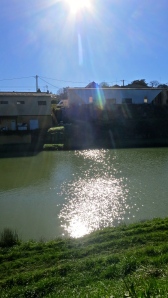 This morning I walked the loop around what I still call the donkey’s field on the D17, returning via the fishing lake. Sun shone in the cloudless blue sky, although it was still rather cool. In the clear light I took a number of photographs which I hope to add when I return to my iMac.
This morning I walked the loop around what I still call the donkey’s field on the D17, returning via the fishing lake. Sun shone in the cloudless blue sky, although it was still rather cool. In the clear light I took a number of photographs which I hope to add when I return to my iMac.
Church bells rang the hour, a cock crew, geese cackled, a magpie rattled, and dogs barked.
The eyes of a small black cat, crouched in the grass of the field that was once home to the donkey and goats, beamed like a car’s headlamps, returning the sun’s gleam.  Further along, a camel-coloured relative had not made it across the road. The field now contains a couple of ewes with muddy backsides.
Further along, a camel-coloured relative had not made it across the road. The field now contains a couple of ewes with muddy backsides.
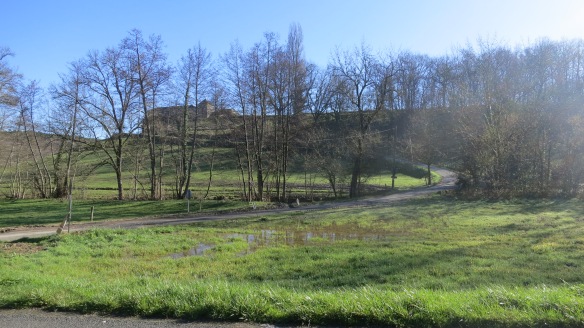
High on its hill, beyond a waterlogged field, Chateau Cluzeau was still visible through a row of as yet leafless trees. Later, I was to look down on its silhouette.
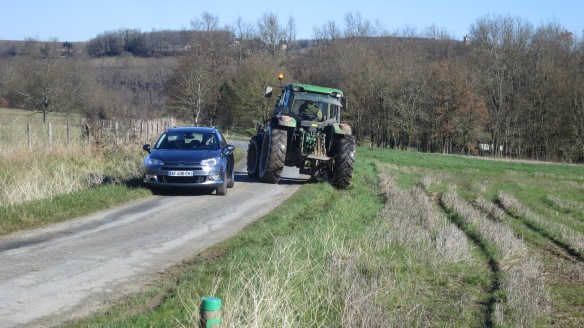
A tractor and a small car negotiated their passing on the narrow lane where I turn left for my return journey. This was reminiscent of trips through the New Forest.
The dogs that normally herald my passing along the top of the high track were unusually silently watchful. The alsatian’s gate was open so I was rather relieved at its unaccustomed lack of interest.

The house I have watched being built over the last couple of years now looks complete.

Paths around the lake were more than a little muddy, reminding me of how slippery my MBTs can be. I didn’t fall over.
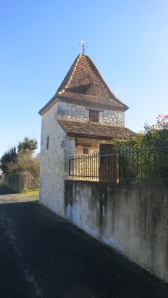
 As I approached the steps leading down to where the bottle banks used to be, I exchanged greetings with three gentlemen whose voices had floated towards me; and with a young man with a long shovel mixing heavy cement in a wheelbarrow as he prepared to repair the steps.
As I approached the steps leading down to where the bottle banks used to be, I exchanged greetings with three gentlemen whose voices had floated towards me; and with a young man with a long shovel mixing heavy cement in a wheelbarrow as he prepared to repair the steps.
A superb onion soup in Le Code Bar today came with croutons and slices of garlic, the delicious fumes of which rose from the bowl. Surprisingly flavoursome calamari was then served with a rich tomato dip. The main course was a succulent steak with lashings of glistening tornellini. The meal was completed by Paris-Brest, a small cake containing coffee cream. I drank a coffee as I wrote this post.
Twelve Good Men and True
It was the second episode of the second series of ‘Inspector George Gently’ that we watched last night. Lee Ingleby’s Sergeant sidekick to Martin Shaw’s Inspector is an interesting departure from the usual device of a rapport between the two leading characters on which such productions hang. He is well played as an unpleasant, prejudiced, individual defending himself against his own vulnerability. This makes the partnership less than ideal, which works in a different way from the more amenable pairings that go back as far as Starsky and Hutch. I have to say that I am not convinced that the series would be compelling without this dynamic.
After television and aperitifs came a meal of spare rib casserole followed by a successful combination of chocolate cake topped with tiramisu, with which I drank a little red wine.
We then had a pleasant evening’s conversation with the usual cut and thrust between Maggie and me in which the others made helpful contributions. Prompted by the recent sex abuse trials of UK celebrities, we discussed the efficacy of the jury system. Neither Cath nor Maggie as served as members of ‘Twelve Good Men And True’, although Mike had once and I had twice.
I was rather surprised to be called a second time approximately ten years after my first stint because I had thought that each man or woman was expected to attend only once in their lifetime.My first spell had been in my late twenties when I played in insignificant role, although I do remember having persuaded a near neighbour I had never met to change his mind.
By my mid thirties my profession had made me proficient at managing and facilitating groups of people, and I am convinced that the jury system has more to do with group dynamics than anything else. Perhaps that is why, in six short cases, I was elected foreman five times.
One of the peculiarites of the English system is that we are expected to take no time at all in choosing our leader. We don’t know each other. Perhaps presence is significant. A larger group than the round dozen is called for compulsory duty. Each prospective member is presented to the defence barrister who has the right to reject anyone he or she does not like the look of. That way, although everyone must appear daily for the allotted period, individual juries have constantly changing membership. Sometimes, for the short cases we heard, there were people we had worked with before, but this is not necessarily so.
One gentleman proudly got himself rejected each time by wearing a pin-striped suit with a copy of The Times protruding conspicuously from his jacket pocket.
The one case that really sticks in my mind must have featured the shortest jury deliberation on record. We are not permitted to discuss trials outside the jury room. This comes after the summing up when we are herded together, given instructions, shut in, and told to press a bell either when we have reached a decision or we need something. As soon as we assembled on this occasion, without discussion, I asked: ‘Shall I ring the bell?’. All agreed. I did so. The usher entered the room and asked what we needed. I said we didn’t require anything because we had reached a verdict. We all trooped back and, when asked, I announced: ‘Not guilty’.
What had happened was that two key witnesses diverged so precisely that it was clear that one was lying. This had been so blatant that a senior police officer had appeared in the courtroom to observe what was going on. I, for one, regretted an earlier guilty verdict we had given had hinged on the evidence of that same witness for the prosecution.
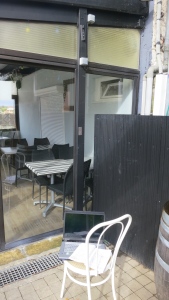 This morning I began reading Susan Hill’s detective novel ‘The Betrayal of Trust’.
This morning I began reading Susan Hill’s detective novel ‘The Betrayal of Trust’.
Before I went up to my usual Sunday perch outside Le Code Bar to send this post, I telephoned Jackie at home. She told me that on the evening of 14th 32 diners had been rescued from a coastal restaurant at Milford on Sea that had been pounded by large rocks thrown up by massive seas and powerful winds. The windows had been smashed by the terrifying missiles, giving the staff and sixteen couples a Valentine’s Night to remember. The house we are about to buy is about two miles inland from there.
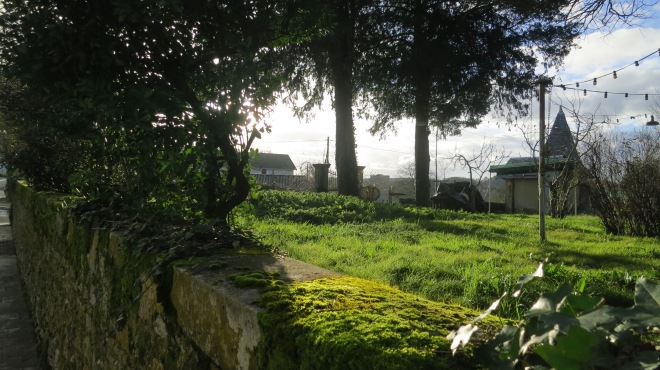
Fortunately the weather here has cleared. This was the evening view of the garden immediately opposite our house.
My Grandfather’s Axe
Yesterday afternoon I finished reading Neal Ascherson’s book ‘Black Sea’, which,like my blog, cannot be categorised. Sandwiched between important ecological sections is a ramble along the littoral of this vast body of water, 90% dead, in the sense that it cannot support life below a certain level. Ascherson tells of the peoples and their origins, often combining myth and reality. He gives us history, geography, philosophy and literature. The book heaves and bustles with lively descriptive, often poetic language, and he makes good use of simile and metaphor.
There are interesting treatises on ethnicity and nationality, nicely encapsulated in an old saying: ‘This is my grandfather’s axe. My father gave it a new helve, and I gave it anew head’. The writer’s point is that the origins of many of the peoples in the countries bordering the sea is unclear yet they have firm beliefs about them. There may be nothing that seems the same as it was, yet they have internalised roots which, like, for example, many Poles or Greeks who have never seen their ancestral lands or spoken the relevant languages, are deep in their psyche.
Ali’s son and Sam’s oldest friend, James Akhurst, lives with his indigenous wife in Ukraine. It was therefore natural that I should pay particular attention to this large country; but I was also informed of and intrigued by the youngest and smallest independent republic of Abkhazia, which emerged from the Georgian war of the 1990s that followed the sudden dramatic collapse of the Soviet Union.
When reflecting on much of the strife that is the history of this region, I once again consider myself fortunate in the time and place of my birth and residence. Our invasions and civil wars were so long ago as to seem insignificant in comparison. My grandfather’s axe, despite the conflicts we do have, is, I believe, in reasonably good shape.
‘Indigenes’ (Indigenous people) is the original title of the 2006 film by Rachid Bouchareb which has, rather inappropriately in my view, been translated as ‘Days of Glory’ on my French-bought DVD. Perhaps this term is ironic. I doubt it, somehow. I watched it last evening. It tells the story of courageous and idealistic North African and African volunteers who enlisted to help France in 1943. It is a magnificent, beautifully photographed depiction of the injustices they faced; the tortuous courage they displayed; and the discrimination they encountered from the nation they helped defend. The one Algerian survivor, powerfully played by Sami Bouajila, ignored by officers and press, watches stoically as the French ‘cavalry’ take all the glory after his comrades’ days of horror. Other lead characters are passionately and tenderly portrayed by Jamel Debbouze, Bernard Blancan, Roschdy Zem and Sany Nacery.
As an epilogue we are told the pensions of these unsung heroes were frozen in 1959. It was not until 2002 that a law was passed to make backdated payments in full, but successive governments have deferred the date of implementation. I don’t know whether or to whom compensation has yet been made.
In Sigoules it rained throughout the night and all day today. Yesterday, I described my MBTs as boats. The Clarks’ ones, left in the garden to drip, now look more like boats in need of being baled out.
Maggie and Mike collected me this morning and drove me to the shopping area outside Bergerac, then back to their home in Eymet. I bought a chain for hanging the mirror Mo and John had bought me on their last visit, and Mike attached it when we got to No 3 chemin de la Sole. After lunch we played Scrabble. Their friend Cath will be joining us soon to watch a recorded episode of Inspector George Gently, after which we will all dine. Someone from Taxi Eymetois will drive me back later.
Shoes
Last night I watched ‘Saints & Soldiers, an excellent film by Ryan Little depicting an heroic ‘journey through the hellish landscape of war-ravaged Europe’ during World War Two, undertaken by a small group of escaped American soldiers and one English airman. It deservedly won 13 international awards. I was familiar with none of the superb cast.
On a much brighter morning I walked up the Cuneges road turning left at the sign for La Bricotey. M. Pazero’s dogs began their usual greeting when I was still 100 yards from his house. The now grey muzzled sandy haired one wheezed between rather hoarse barks. The black one, like a car driver hurling insults from a safe distance, was silent until I’d passed his corner.
On the hill slopes a couple of people were tending vines in the distance. Their voices surfed towards me on the stiff breeze.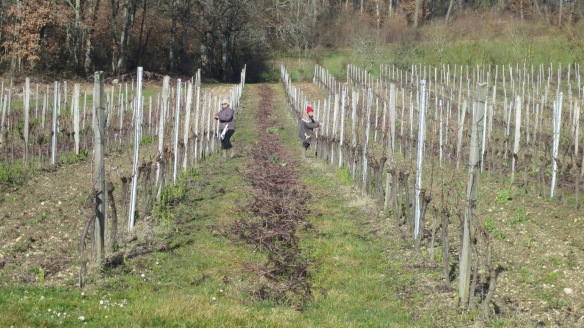 I hope to be able to post their photographs when I have resolved the continuing problem with transfer from the camera. (Done)
I hope to be able to post their photographs when I have resolved the continuing problem with transfer from the camera. (Done)
Today my shoes were MBTs (Masai Barefoot Trainers), apparently designed to produce the deportment of the inhabitants of Kenya and northern Tanzania. I had bought these, one pair for England, and one for France, in 2009, believing they may help my hip problem. In the event, they seemed counter-productive. I ditched the English ones, but fortunately left a pair in Sigoules.
During the snowy weather of December 2010, soon after my replacement operation, the tier of steps outside the Ridgway house in Wimbledon Village was so icy that I slipped on them. I identified the reason for my precarious descent to be the curve of the soles of the MBTs. It was as if my feet were encased in boats with only the centres of the smooth soles meeting the slippery surfaces beneath them. Jackie and I went straight to Clarks shoeshop in Wimbledon and bought a pair of their footwear with flat, ridged, soles. They gave me much more purchase, and it was those I wore yesterday. Today, still saturated from Yesterday’s downpour, they are hanging in the garden in the hope that they may drip dry.
Yesterday’s soup, repeated at the Le Code Bar lunch today was followed by ham and egg salad; succulent steak, chips, and green beans, and a flavoursome pear flan. I drank Perrier with this and a coffee afterwards.
Technical Frustrations
Last night the internet reception was hit and miss, which is one reason why my post was shorter than usual (I’ve just lost it again). I was also knackered, but mostly I wanted Orlaith’s photograph to stand alone.

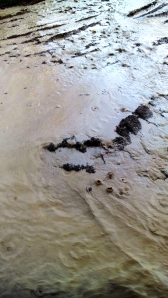 This morning, taking advantage of what I thought was a lull in a night of rain, I walked the La Briaude loop. I hadn’t got very far on the straight stretch towards the hamlet when I was soaked to the skin, even through my raincoat. The chainsaw that was ripping into the back of my head was hail. The wind was the fiercest I have experienced. The rain was blinding and the hail piercing. The photographs of the rainswept field and the lake that was the road, were taken with eyes closed, by pointing, shooting, and hoping for the best.
This morning, taking advantage of what I thought was a lull in a night of rain, I walked the La Briaude loop. I hadn’t got very far on the straight stretch towards the hamlet when I was soaked to the skin, even through my raincoat. The chainsaw that was ripping into the back of my head was hail. The wind was the fiercest I have experienced. The rain was blinding and the hail piercing. The photographs of the rainswept field and the lake that was the road, were taken with eyes closed, by pointing, shooting, and hoping for the best.
Had the tumult not been coming from behind me, I would have turned back, but I could not have faced the driving rain and the painful hailstones.
As I struggled, head down, along the Eymet Road the wind roared through my ears and the violent precipitations spattered on my raincoat. Had I been offered a lift I would have taken it. Normally when a kindly driver stops for me I say I am walking for pleasure. I wasn’t about to give anyone a story to tell about the mad Englishman.
When I reached the corner indicating the last kilometre back to Sigoules, the downpour ceased, but the wind did not.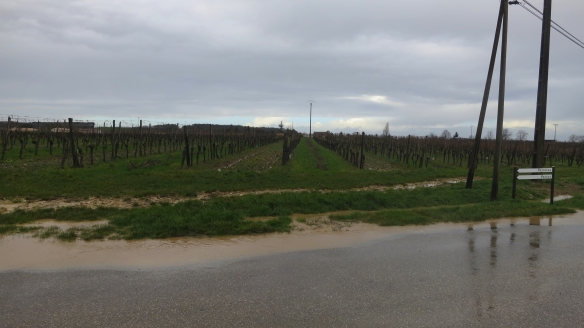 A thin sliver of blue sky beyond the saturated vines appeared beneath the flat, leaden, cloud layer.
A thin sliver of blue sky beyond the saturated vines appeared beneath the flat, leaden, cloud layer.
Upon my arrival, I peeled off and attempted to dry all my wet clothes. Changing apparel involved taking the trouser challenge. I have been aware that recent pressure on my waistbands has suggested that my older garments retained in rue St Jacques may no longer quite accommodate me. They didn’t, so I failed the test and was compelled to pull my wet pants back on.
Mo and John came over to Sigoules bringing my obsolete iMac and the bulk of my DVD collection so I can watch them on a bigger screen; and to treat me to lunch at Le Code Bar.
Max provided the usual excellent fare. An intriguing and delicious soup containing noodles, lentils and potatoes was followed by quiche for Mo and belly of veal in a piquant sauce for John and me. John opted for steak whilst Mo and I chose sausages for the main meal accompanied by the customary mountain of chips. We all selected creme brulee for dessert, and shared a carafe of red wine.
We enjoyed each other’s convivial company and went on, following Max’s recommendation, to L’Ancienne Cure, Christian Roche’s wine outlet at Colombier where we engaged in pleasant conversation with the proprietor who had been a friend of Max since they were boys. They had played rugby together and I wouldn’t have liked to have met either of them on the field. They each possess a grip of iron. After ample tasting, John made a purchase, and Mo drove us back to Sigoules.
In eager anticipation, I plugged in the iMac. Unfortunately, I hadn’t thought to bring either a mouse or a keyboard, so I couldn’t use it.
My technical frustration was to continue. Either my laptop or my card reader is playing up. I had the devil’s own job to download the three photographs I had taken in the morning and was completely unable to transfer the heart-warming shot of the open fire in the winery fuelled by spent vine stems.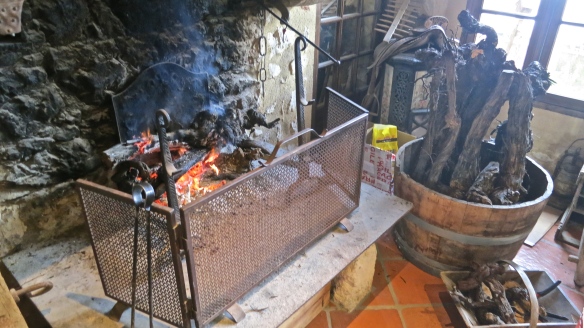 I may have to wait until I return to England next week to illustrate the rest of the next few days’ posts.
I may have to wait until I return to England next week to illustrate the rest of the next few days’ posts.
P.S. Back home with iMac
Peepo
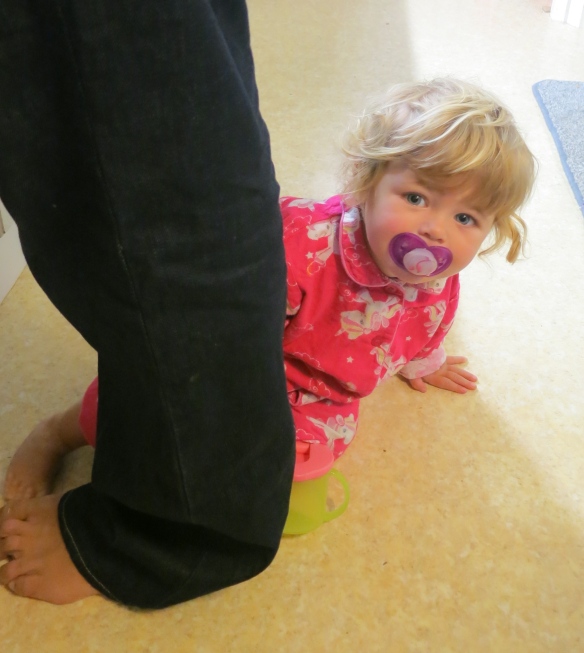 Up early this morning, Orlaith is still wary of me, although she was tempted to peep out from the shelter of her Dad’s legs. When I opened the kitchen bin to add a firmly wrapped up disposable nappy, I found half the contents of the spice rack posted in there.
Up early this morning, Orlaith is still wary of me, although she was tempted to peep out from the shelter of her Dad’s legs. When I opened the kitchen bin to add a firmly wrapped up disposable nappy, I found half the contents of the spice rack posted in there.
I hadn’t used my printer yesterday, but somehow it kept turning itself on. It did the same this morning. The button is 50 centimetres from the ground. Any ideas?
I had a smooth journey to Sigoules by my usual method. Sandrine was Taxi Eymetois’s driver waiting at Bergerac to drive me to rue St Jacques where Saufiene and Stefan attended with Champagne on the kitchen table. We had a long chat after which I watched Skyfall in which Daniel Craig starred as the implausibly indestructible James Bond. Judy Dench was a magnificent M and Javier Bardem a convincing villain. While the hero created noisy mayhem on the screen there was a clattering from within the house which was certainly not part of the film. Investigation revealed a folding chair which had fallen from its resting place in the back corridor.
I dined on cornflakes and repaired to le Code Bar where I was welcomed by David and Fred. Graham was also there. David was very appreciative of the call from Mike Kindred alerting him to the scam. Fred said Mike’s French was very good.
Sneaky Little Becky
Taking advantage of a comparatively bright lull between gale force storms, I walked up to Hazel Hill Cottage in London Minstead to buy some eggs. There were no boxes on their usual perch. In view of the very high winds we experienced overnight that was hardly surprising. I received the usual amount of attention from the snappy little guards in canine form, wished them good day, retraced my steps as far as Bull Lane, and took the footpath down to the village shop where I made my purchase. Hiding behind a suitable tree, I dropped one of the boxes whilst having a pee. Only one egg was cracked.
Berry, Dave and Gladys were looking most purposeful as I set out. Gladys led a striding Berry up Upper Drive, whilst Dave manufactured a warning notice. Berry was soon on her mobile phone, taking control of the situation. This was no doubt a moment when her Forestry Commission experience and contacts would come in handy.

You see, a very large tree had fallen in the night. The upper branches completely blocked the road.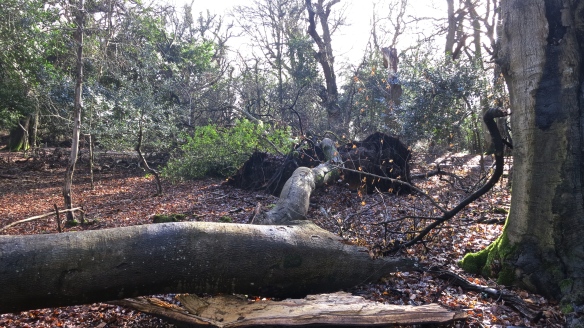 The trunk stretched a long way into the forest on the right hand side as you leave the garden. I walked around it and found it had brought a cable down with it. Although loose, the wire didn’t seem to have been broken.
The trunk stretched a long way into the forest on the right hand side as you leave the garden. I walked around it and found it had brought a cable down with it. Although loose, the wire didn’t seem to have been broken. 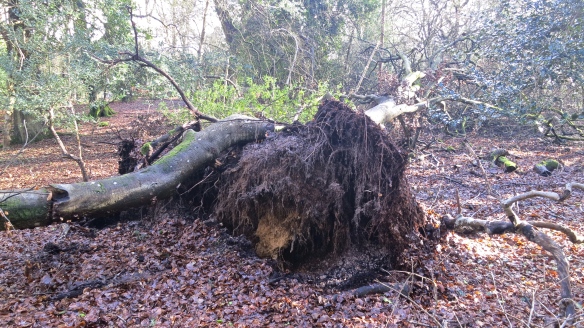 The roots of this casualty demonstrate how shallow they are. This is common throughout the forest. It makes you wonder how they manage to stay up at all.
The roots of this casualty demonstrate how shallow they are. This is common throughout the forest. It makes you wonder how they manage to stay up at all.
Using her gardening experience Jackie suggests that the unusual amount of rain we have received over the last few years has rotted the roots, just as will overwatering a potted plant. The huge trees that are coming down are not bog-loving ones.
This arboreal disaster does, of course, raise a philosophical question. We were not there and we didn’t hear anything. As the tree fell, did it make a sound?
A day or so ago we received a text from Becky asking if we’d be around today and this evening because she needed a bed for the night as she had to be in Lyndhurst in the morning. Wondering just why she had to be in Lyndhurst, of course we agreed without question.
This afternoon someone knocked on our living room window. A blonde toddler appeared. On her own, held high in the air, as she would have to be to reach our windows.
Who could that be? We both, puzzled, approached the window.
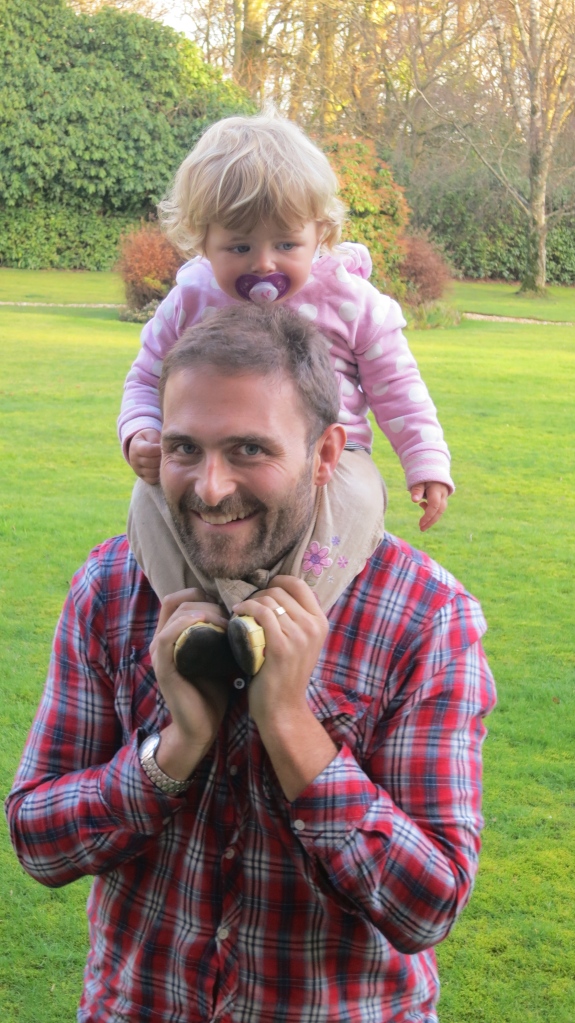
There, underneath Orlaith, grinning from ear to ear, stood Sam. And they were supposed to be in Perth. Australia, that is.
Becky and Flo turned up later, and jolly fun ensued. The fact that we had been taken by surprise meant that we had not child-proofed the flat. We got out the toys that Malachi had prevailed upon us to get in stock, and a Princess tent bought for Orlaith’s cousins Jessica and Imogen. Even when Orlaith got a bit excited the fact that everything had not been removed from toddling reach was not as problematic as it might have been. She took an unaccountable shine to Flo, and enjoyed running up and down the flat. I was asked to lift her into her cot so she could pick up her Bunny and her dummy; then to lift her out again so she could post the dummy under the sofa.
During the last period of high jinks Jackie disappeared into the kitchen to pad out the usual delicious chicken jalfrezi (recipe) and savoury rice, and add an egg korma to cater for the increased numbers. So It was just as well I’d gone shopping in the morning. Orlaith went to bed, lay down like a lamb and rapidly went to sleep, leaving the adults to enjoy the meal and Maipo merlot 2012.
Becky and Flo returned home, and Sam ‘crashed’.
Pollack
Our electrical timers gave us the definitive answer to how long the lights were out yesterday. It was the full hour. If we can trust them.
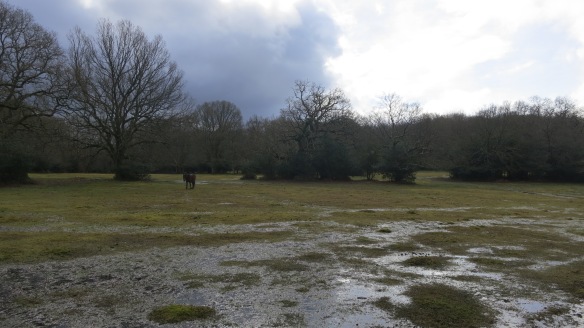
Widdershins, on this morning of sunshine and showers, I walked the Shave Wood Loop, returning via Bull Lane.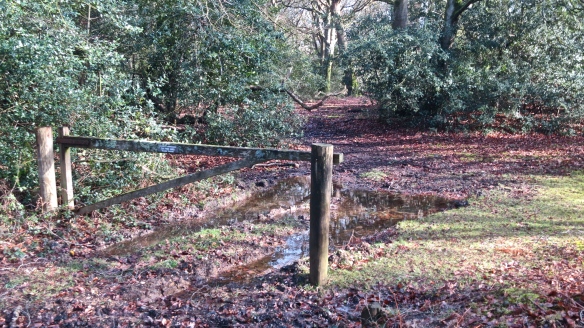
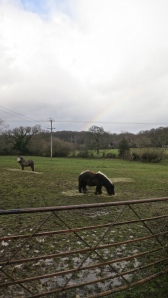
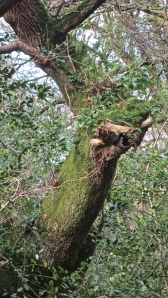 Fields remained waterlogged. Tinkling streams twinkled when the sun shone through the clouds. Busy little birds chirruped in the trees and hedgerows, and an ever-elusive woodpecker could be heard practising carpentry.
Fields remained waterlogged. Tinkling streams twinkled when the sun shone through the clouds. Busy little birds chirruped in the trees and hedgerows, and an ever-elusive woodpecker could be heard practising carpentry.
Toy ponies in London Minstead were unimpressed by the feeble rainbow that did its best to enhance their backdrop. A dark brown one was given the impression of being backlit by the mane and tail of its two-toned companion.
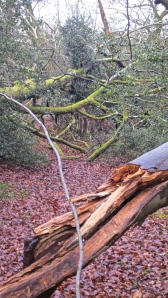 Bracken is now taking root in the branches of the gnarled old trees, although Shave Wood has received its share of devastation.
Bracken is now taking root in the branches of the gnarled old trees, although Shave Wood has received its share of devastation.
A third heap of ‘sold’ timber lies by the forest verge.
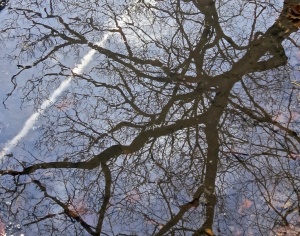 A jet trail shimmered beneath the branches reflected in the camber of the tarmac, causing me, continuing yesterday’s philosophical theme, to question how we know whether the white exhaust stream is above or below the trees? Do our eyes deceive us?
A jet trail shimmered beneath the branches reflected in the camber of the tarmac, causing me, continuing yesterday’s philosophical theme, to question how we know whether the white exhaust stream is above or below the trees? Do our eyes deceive us?
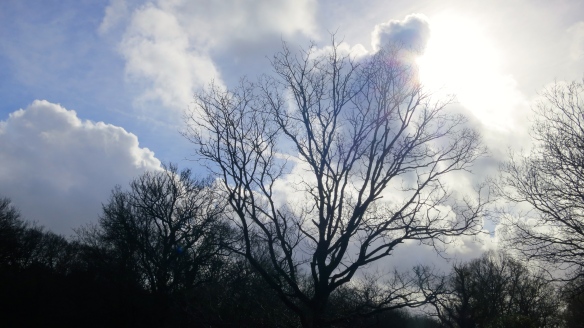
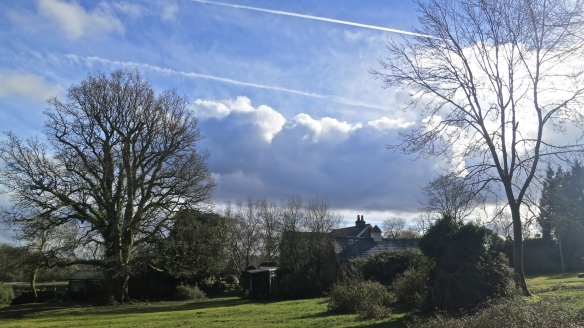
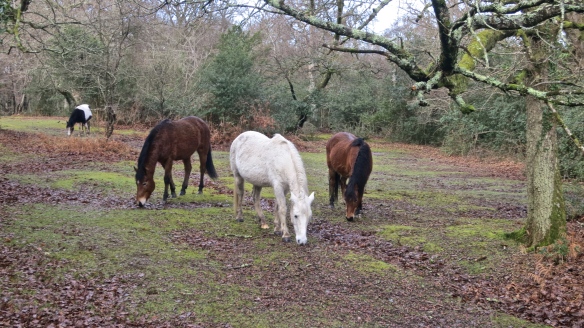
Round-bellied ponies chomping in the wood are clearly finding food much easier to come by than at this time last year.
This afternoon Jackie drove us to Ringwood for shopping and banking. The variable, but pleasant, weather continued.
Having missed out on fish and chips yesterday, we dined on them this evening. Our battered fish was pollack, a creature until recently regarded as only fit for cats. We both thought it had more flavour than cod. Not as pure white as its more popular relative, we are not put off by its greyish hue. And we are told cod is rapidly dying out from over-fishing anyway, so we had better get used to it.